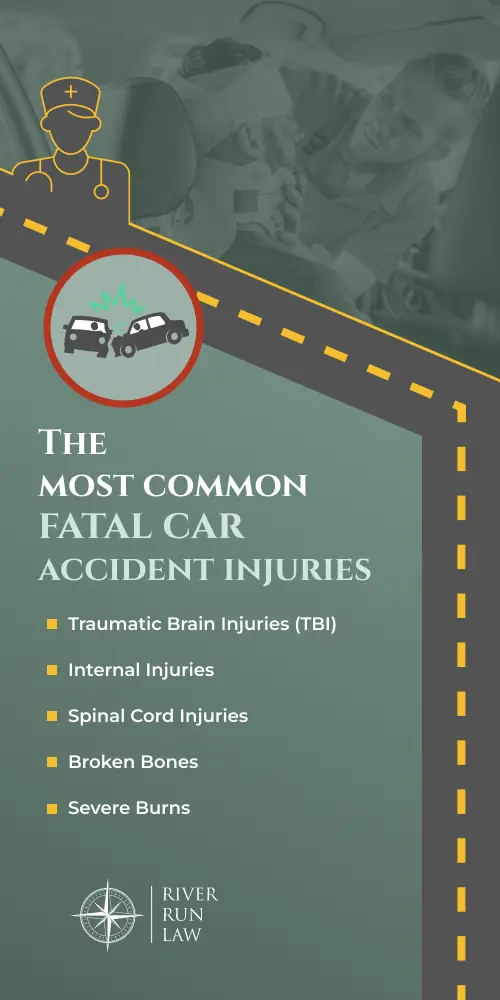Brooke graduated from the University of Richmond School of Law after receiving her undergraduate degree from the University of North Carolina at Chapel Hill. Brooke worked for five years in private practice with a law firm specializing in insurance defense litigation before becoming the trial litigator for Allstate Insurance Company in the metro Richmond area.
Fatal injuries from car accidents are absolutely devastating for survivors of the accident victim. Knowing that traffic accidents are sudden and generally preventable only adds to the gravity of the loss.
Every life is important. In 2021, the Department of Motor Vehicles (DMV) reported 968 fatalities on Virginia roadways.
In addition, 161 people were injured daily in the Commonwealth due to traffic collisions.
No monetary amount can ever compensate for the loss of your loved one, but it can help to ease the financial burden and set an example for negligent drivers.
Contact a skilled and compassionate car accident attorney in Virginia online or call (804) 889-0500 for a free consultation. We can offer you advice that is specific to your situation.
Vehicle Safety Standards
Manufacturers build cars to be functional and as safe as reasonably possible. When people drive cars as intended, there should be no risk to life.
Though crashes are not an “intended use” for a car, manufacturers are certainly aware that crashes occur.
This makes them responsible for making the vehicle as safe as possible under a variety of circumstances.
This is why most vehicles have seatbelts, airbags, and tempered glass. The types of materials used for certain portions of the car are intended to provide vehicle integrity upon impact and minimize injuries.
Many newer vehicles have even more safety features, such as backup cameras, blind spot sensors, and more.
Unfortunately, each car accident is unique, and these precautions may not be enough in all situations.
Most Common Fatal Injuries From Car Accidents

Though there are many ways that fatal injuries from a car accident can occur, these are some of the most common.
Traumatic Brain Injury (TBI)
A traumatic brain injury can be hard to diagnose. Any trauma to the head can be life-changing.
Because drivers and passengers in a vehicle are generally not prepared for impact, the body is not braced to protect the head.
Mild cases of TBI can result in temporary symptoms of headaches, dizziness, slowed speech, and more. Severe cases can result in long periods of unconsciousness or coma, which can also be fatal.
Internal Fatal Injuries
Bruising and lacerations are easy to identify. Internal injuries and bleeding are much harder to see and often require a diagnosis from a medical professional using specialized diagnostic equipment.
Internal injuries and bleeding can start after the accident and continue while the victim is in the ambulance or emergency room. And such injuries can sometimes go on for an extended period of time without being noticed.
Internal bleeding can happen quickly, and if the bleeding is serious enough, the fatality may occur before medical treatment can be administered.
Spinal Cord Fatal Injuries
Due to sudden impacts that jar the body, car accidents can cause significant damage to the spinal cord or nerve endings.
The resultant injuries are some of the most common fatal injuries in car accidents.
Spinal cord injuries may result in loss of movement, cough, difficulty breathing, and even paralysis. A severed spinal cord can be fatal.
Broken Bones
In most cases, broken bones from car accidents heal well and leave only a bump or a scar. If bone fragments puncture an organ, the results can be fatal.
Like many internal injuries, there may be a delay in identifying what is going on.
Severe Burns
Burns are gauged by degrees—with first-degree referring to damaged skin and the fourth being deep enough to damage muscle and bones.
Even first-degree burns can prove fatal if they cover over 50% of the body. Burn victims have a high probability of infection, which can also lead to fatal complications.
Fatal accident examples include:
Car Accidents: These can result in fatal injuries due to high-speed collisions or other factors like impaired driving.
Falls: Fatal falls can occur from heights, such as rooftops or ladders.
Poisonings: Accidental ingestion of toxic substances can lead to fatal outcomes.
Drowning: In water-related accidents, drowning can result in fatalities, especially when proper safety measures are not followed.
Suffocation: This can happen due to choking, asphyxiation, or other respiratory issues.
Determining Liability
The last thing you want to do when coping with the death of a loved one is worry about taking legal action.
Virginia is an “at-fault” state, which means that the person or party that caused the accident is financially responsible for the damages incurred.
Compensation is generally paid by the insurance company, but it is important to recognize that those companies are likely to offer less than what your settlement is worth.
You do not have to accept the offer.
Claims involving fatal injuries are especially sensitive, and you should seek legal counsel from an experienced personal injury attorney.
Virginia adheres to the principle of pure contributory negligence. This means if the defendant is not found 100% at fault for the accident, the victim is barred from recovery.
Insurance companies know this and will do their best to find you or your loved one at least partially at fault. River Run Law’s team of personal injury specialists understands how these companies work.
We are happy to conduct an independent investigation of the accident, negotiate on your behalf, and litigate if needed.
Contact a Richmond Car Accident Lawyer at River Run Law
Losing a loved one due to fatal car accident injuries can be unbearably painful. The last thing you want to worry about is bills incurred due to their death.
We are committed to compassionate representation during these hard times. Let us take care of your legal claim, so you can focus on grieving and healing.
Contact the car accident lawyers at River Run Law for your free case consultation. You can also reach us at (804) 889-0500.
[Related] 5 Common Rear-End Collision Injuries and How to Address Them



